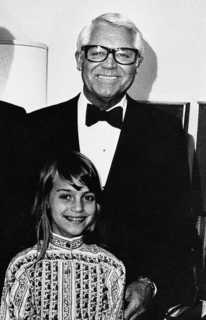A Quote by Sydney Schanberg
It's very easy to say that something is a shadow of itself, and it may be true in some senses.
Related Quotes
We are, in fact, hyper-dimentional objects of some sort which cast a shadow into matter, and the shadow in matter is the body. And at death, what happens basically, is that the shadow withdraws, or the thing which cast the shadow withdraws, and metabolism ceases, and matter which had been organized into a dissipative structure in a very localized area, sustaining itself against entropy by cycling material in and degrading it and expelling it, that whole phenomenon ceases, but the thing which ordered it is not affected by that.
All men are brothers, we like to say, half-wishing sometimes in secret it were not true. But perhaps it is true. And is the evolutionary line from protozoan to Spinoza any less certain? That also may be true. We are obliged, therefore, to spread the news, painful and bitter though it may be for some to hear, that all living things on earth are kindred.
The conditions of a true critique and a true creation are the same: the destruction of an image of thought which presupposes itself and the genesis of the act of thinking in thought itself. Something in the world forces us to think. This something is an object not of recognition but of a fundamental encounter
When you say 'Yes' or promise something, you can very easily deceive yourself and others also, as if you had already done what you promised. It is easy to think that by making a promise you have at least done part of what you promised to do, as if the promise itself were something of value. Not at all! In fact, when you do not do what you promise, it is a long way back to the truth.
I've heard people say that [I have a short attention span]. I don't feel I do, because when I'm interested in something I'll stay in focus as long as it is necessary... If you get off on something I'm not very interested in, it's very easy for me to block it out. It's easy for me to block things out.
Something can be symbolic without being a mere stand-in or vessel, which just brings us away from the true mystery and dread, into some boring version of what we already know. So what you say is true, in that the bear is a kind of parallel to the speaker, or imagined as such, but also very different. So if it's a symbol it is - ahem - a polysemous one.
It may be said of some very old places, as of some very old books, that they are destined to be forever new. The nearer we approach them, the more remote they seem: the more we study them, the more we have yet to learn. Time augments rather than diminishes their everlasting novelty; and to our descendants of a thousand years hence it may safely be predicted that they will be even more fascinating than to ourselves. This is true of many ancient lands, but of no place is it. so true as of Egypt.
Sometimes, when we're terrified of embracing our true calling, we'll pursue a shadow calling instead. That shadow career is a metaphor for our real career. Its shape is similar, its contours feel tantalizingly the same. But a shadow career entails no real risk. If we fail at a shadow career, the consequences are meaningless to us. Are you pursuing a shadow career?
One of the most commonly overlooked spiritual practices is daring to be completely honest with everyone you encounter. Some may say others cannot handle their honesty, but true honesty is not a strategy or a weapon of any kind. It is the willingness to be open and absolutely transparent in sharing how any moment feels in your heart. It has nothing to do with confrontation, accusation, or any form of blame. True honesty is the willingness to stand completely exposed, allowing the world to do what it may, and say what it will, only so you may know who you are - beyond all ideas.

































